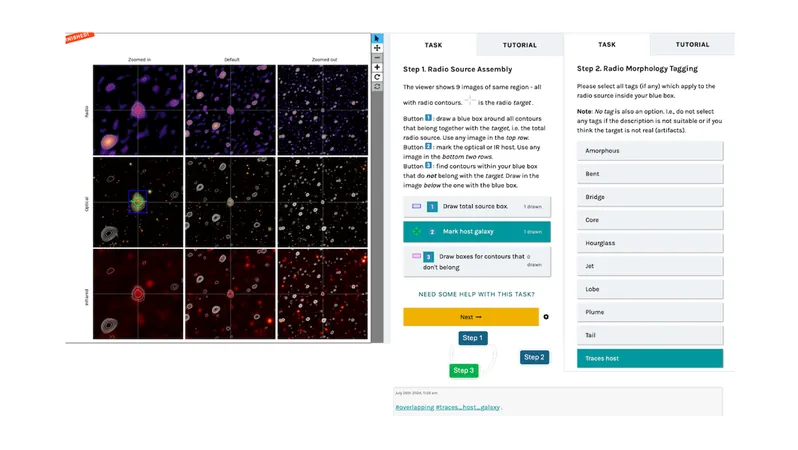
US Surgeon General Urges Cancer Warnings on Alcohol: A New Call for Awareness Amid Controversy
2025-01-03
Author: Siti
Significant Shift in Public Health Guidance
In a significant shift in public health guidance, the US Surgeon General, Dr. Vivek Murthy, announced on January 3 that alcoholic beverages should carry warning labels similar to those on cigarette packs. This call comes in light of growing evidence that alcohol consumption is a leading preventable cause of cancer, contributing to approximately 100,000 cancer diagnoses and 20,000 related deaths annually in the United States.
Contradicting Historical Guidance
The announcement arrives as the US Dietary Guidelines for Americans are set to be updated. Historically, moderate drinking has been suggested to have cardiovascular benefits, including the prevention of heart attacks and strokes. However, new research increasingly contradicts this notion, linking even moderate alcohol consumption to a heightened risk of various cancers, including breast and colon cancer.
Current Labeling Practices vs. Proposed Changes
Current warning labels on alcohol primarily caution against drinking during pregnancy or before operating machinery, but the Surgeon General advocates for more comprehensive labels that address cancer risks directly. "Many people assume that drinking within the limits of one drink per day for women and two for men poses no health risks," Dr. Murthy stated. "However, the data indicates otherwise when it comes to cancer risk."
Congressional Authority and Administrative Support
Congress holds the authority to mandate these new warnings, yet it remains uncertain whether the incoming administration will support such measures. Interestingly, President-elect Donald Trump is known to abstain from alcohol, and his nominated Health and Human Services Secretary, Robert F. Kennedy Jr., has been sober for decades and actively participates in Alcoholics Anonymous meetings.
Debate Over Moderate Drinking
Although heavy drinking is universally recognized as harmful, proponents of moderate alcohol consumption—including some health experts and beverage manufacturers—argue that it can confer certain health benefits, particularly regarding heart health. However, recent studies have cast doubt on these claims. New evidence suggests that there may be no safe level of alcohol consumption, as any amount could increase the risk of cancer.
Link Between Alcohol and Cancer
The Surgeon General pointed out that while most cancers appear in individuals who exceed the existing alcohol consumption guidelines, certain cancers, particularly breast cancer and cancers of the mouth and throat, may increase with just one drink per day. Alarmingly, Dr. Murthy revealed that one out of every six breast cancer cases in the US can be linked to alcohol.
Upcoming Scientific Reviews
Two upcoming scientific reviews will inform the latest recommendations concerning alcohol in federal dietary guidelines. The last comprehensive report, five years prior, acknowledged alcohol as a carcinogen but maintained the status quo on drinking guidelines, which continues to recommend up to two drinks per day for men.
Industry Opposition and Global Context
Despite a wealth of evidence suggesting a connection between alcohol and various cancers, attempts to amend labeling practices face substantial industry opposition. The current warning label has remained unchanged since 1988, despite extensive knowledge regarding the relationship between alcohol and breast cancer that dates back to 2000.
Evolving Global Conversation
Globally, the conversation around alcohol warnings is also evolving. The World Health Organization asserts that no consumption level is safe, while 47 countries currently mandate warnings on alcoholic beverages, though cancer rarely features in these advisories. Notably, Ireland plans to introduce new labels highlighting a direct link between alcohol and fatal cancers by 2026.
Need for Increased Awareness
The focus on alcohol-related cancer risk is not without its complexities, as studies continue to emerge that either support or contest these connections. Yet, one thing remains clear: increased awareness of the potential risks associated with alcohol consumption is crucial. Dr. Murthy emphasized that while each individual's cancer risk varies based on genetic and environmental factors, consuming less alcohol generally lowers the risk.
Conclusion: Rethinking Drinking Habits
As public health officials strive to balance messages about moderate drinking with emerging research, citizens must be informed and mindful of the choices they make regarding alcohol. It’s a critical conversation that could save lives and fundamentally change how alcohol is perceived in society. The question remains: will we heed these warnings and rethink our drinking habits?







 Brasil (PT)
Brasil (PT)
 Canada (EN)
Canada (EN)
 Chile (ES)
Chile (ES)
 Česko (CS)
Česko (CS)
 대한민국 (KO)
대한민국 (KO)
 España (ES)
España (ES)
 France (FR)
France (FR)
 Hong Kong (EN)
Hong Kong (EN)
 Italia (IT)
Italia (IT)
 日本 (JA)
日本 (JA)
 Magyarország (HU)
Magyarország (HU)
 Norge (NO)
Norge (NO)
 Polska (PL)
Polska (PL)
 Schweiz (DE)
Schweiz (DE)
 Singapore (EN)
Singapore (EN)
 Sverige (SV)
Sverige (SV)
 Suomi (FI)
Suomi (FI)
 Türkiye (TR)
Türkiye (TR)
 الإمارات العربية المتحدة (AR)
الإمارات العربية المتحدة (AR)